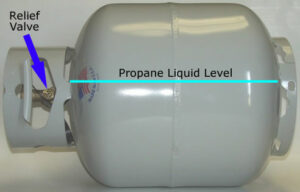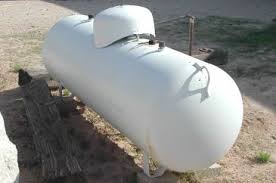Propane is a by-product of natural gas processing and petroleum refining; it is commonly used as a fuel for engines, barbecues, portable stoves, residential heating and can be used for lighting. I consider propane the best fuel to store in bulk. It is the safest, easiest to store and has a very long shelf life. Propane will last as long as the container remains intact.
Propane is stored as a liquid when under pressure in the tanks. Upon being released to the atmosphere, it vaporizes into a gas. While it is the safest fuel to store, it still has a certain degree of danger. The tanks should be store in the position that the manufacture specifies.
An example of the incorrect storage of propane tanks.
The picture below depicts an unsafe storage position for small propane cylinders. The picture assumes that the 20 lb. cylinder has a little over 50% propane. Even with the tank around half full, the liquid inside is above the level of the safety relief valve. The relief valve needs to be in communication with the vapor space of the cylinder in case it opens. For this reason, all consumer propane cylinders such as this should be stored in an upright position. This would normally be the 4 – 40 pound tanks. Larger tanks of propane should be placed in a location per the manufactures recommendation.

Propane tanks are readily available up to a 1000 or more gallons and in most parts of the US are easy to get filled. Many areas have few regulations on the locations of the tanks and the condition of storage. Since propane is a heavier then air gas and will flow along the contours of the ground like water, a big consideration is where to place your tanks. Place your tank downhill if possible from your residence and other important locations in case of a leak. I have seen it flow downhill and accumulate under a building until it reached an ignition source. The resulting explosion destroyed the building.
If you are on currently on natural gas and are thinking of converting to propane in an emergency, contact your propane company and get the correct size orifices for propane. They are different from natural gas and if you fail to change them, it can create a serious hazard.
I like propane as a fuel and have a duel fuel truck that runs on both propane and gasoline. We also have tri fuel generators that will run on propane, natural gas and gasoline. If you are thinking of converting vehicles or generators to propane get the conversion kits beforehand, without them; this would be a very difficult conversion to make.
Where I live you can still get propane cheaper than gasoline and it does not have the short shelf life of modern gasoline.
Propane Safety Guidelines for the Home
- Examine the valves and other fittings for signs of corrosion or rust. If you suspect a leak, spray the fitting with soapy water and water for bubbles. If you find a leak, shut the system down and get help.
- Propane leaks smell like rotten eggs. Educate your family so they may recognize the smell.
- If you smell a leak, evacuate the premises, and contact your local fire department. When leaving the premises, do not alter any electrical outlets or light switches.
- Propane leak detectors are available at your local hardware stores.
- Know the layout of your gas services lines, especially if you are doing any type of landscaping or renovations.
- If you suspect your gas appliance has been damaged by water or flooding, have a trained technician come out and service your system.
- In case of sediment buildup in your propane fueled water heater, drain your tank until water runs clean.
- Have your range serviced if the flames are not blue. Yellow flames indicate blockage to the air inlets, or an adjustment may be need to the burner. Contact a technician to service.
- Never use a gas range or grill to heat your home.
- Propane is heavier than air and will flow to the low areas.
- Make sure everyone in your family or group knows how to turn the propane off.
- Be sure you know how to turn your system back on safely. This means knowing how to relight the pilot lights


Have your fuel storage for your backup genset separate from the supply used for household appliances such as stove, water heater, gas grill, etc. This way you will not deplete your reserve capacity for backup power by ordinary daily use. Monitor fuel consumption during weekly test cycles. Generac units are usually programmed to run a 15-minute test cycle weekly to keep the battery charged. A 10 Kw unit consumes about 1.5 gallons per hour at 50% duty cycle, so over a year of idle time operating for weekly tests only, uses about 18 gallons of fuel. Cheap insurance. Install an hour meter on the engine and change the oil every 100 hours of operation. Check the engine oil and perform a load test on the battery in the sprjng and fall.
Is it okay to bring the propane tank home in the trunk with it lying down? I have a tank for my bbq grill, but I don’t think we can have the long tanks in the yard here in the city.
The five gallon tanks should fit in your car trunk standing. I would not lay them down in case o an accident.
Howard